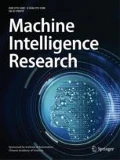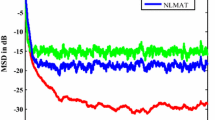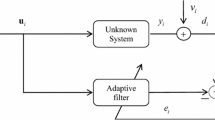Abstract
Considering the situation that the least-squares (LS) method for system identification has poor robustness and the least absolute deviation (LAD) algorithm is hard to construct, an approximate least absolute deviation (ALAD) algorithm is proposed in this paper. The objective function of ALAD is constructed by introducing a deterministic function to approximate the absolute value function. Based on the function, the recursive equations for parameter identification are derived using Gauss-Newton iterative algorithm without any simplification. This algorithm has advantages of simple calculation and easy implementation, and it has second order convergence speed. Compared with the LS method, the new algorithm has better robustness when disorder and peak noises exist in the measured data. Simulation results show the efficiency of the proposed method.
Similar content being viewed by others
References
X. F. Wu, Z. Q. Lang, S. A. Billings. An orthogonal least squares based approach to FIR designs. International Journal of Automation and Computing, vol. 2, no. 2, pp. 163–170, 2005.
F. Ding, T. W. Chen. Hierarchical least squares identification methods for multivariable systems. IEEE Transactions on Automatic Control, vol. 50, no. 3, pp. 397–402, 2005.
M. Lovera, T. Gustafsson, M. Verhaegen. Recursive subspace identification of linear and non-linear wiener statespace models. Automatica, vol. 36, no. 11, pp. 1639–1650, 2000.
M. Verhaegen. Identification of the deterministic part of MIMO state space models given in innovations form from input-output data. Automatica, vol. 30, no. 1, pp. 61–74, 1994.
F. Ding, T. W. Chen, L. Qiu. Bias compensation based recursive least-squares identification algorithm for MISO systems. IEEE Transactions on Circuits and Systems II: Express Briefs, vol. 53, no. 5, pp. 349–353, 2006.
X. H. Huang, X. J. Zeng, M. Wang. SVM-based identification and un-calibrated visual servoing for micromanipulation. International Journal of Automation and Computing, vol. 7, no. 1, pp. 47–54, 2010.
F. Ding, T. W. Chen. Performance bounds of forgetting factor least-squares algorithms for time-varying systems with finite measurement data. IEEE Transactions on Circuits and Systems, vol. 52, no. 3, pp. 555–566, 2005.
W. X. Zheng. Fast identification of autoregressive signals from noisy observations. IEEE Transactions on Circuits and Systems II: Express Briefs, vol. 52, no. 1, pp. 43–48, 2005.
C. Z. Fang, D. Y. Xiao. Process Identification, Beijing, China: Tsinghua University Press, pp. 457–460, 1988. (in Chinese)
S. N. Elian, C. D. S. Andre, S. C. Narula. Influence measure for the L 1 regression. Communications in Statistics. Theory and Methods, vol. 29, no. 4, pp. 837–849, 2000.
C. Bogani, M. G. Gasparo, A. Papini. Pattern search method for discrete L1-approximation. Journal of Optimization Theory and Applications, vol. 134, no. 1, pp. 47–59, 2007.
X. Q. Zhou, J. D. Wang. A genetic method of LAD estimation for models with censored data. Computational Statistics and Data Analysis, vol. 48, no. 3, pp. 451–466, 2005.
L, Peng, Q. W. Yao. Least absolute deviations estimation for ARCH and GARCH models. Biometrika, vol. 90, no. 4, pp. 967–975, 2003.
H. R. Cao. System identification based on the leastabsolute criteria. Techniques of Automation and Applications, vol. 28, no. 7, pp. 8–10, 2009. (in Chinese)
J. H. Xiao, W. L. Yang, J. Li. Realization of least-absolute regression using linear programming based on Matlab. Journal of Wuyi University (Natural Science Edition), vol. 20, no. 1, pp. 5–9, 2006. (in Chinese)
L. Xu, Y. H. Zhou, B. C. Wei. Influence analysis of LAD regression based on MM algorithm. Applied Mathematics A Journal of Chinese Universities (Series A), vol. 22, no. 1, pp. 48–58, 2007. (in Chinese)
X. P. Xu, F. C. Qian, F. Wang. New method for identification of Wiener-Hammerstein model. Control and Decision, vol. 23, no. 8, pp. 929–933, 2008. (in Chinese)
Author information
Authors and Affiliations
Corresponding author
Additional information
This work was supported by Important National Science & Technology Specific Projects (No. 2011ZX05021-003)
Bao-Chang Xu graduated from Northeast Petroleum University (NPU), China in 2000. He received his master degree from NPU in 2000, and received his Ph.D. degree from Beijing University of Aeronautics and Astronautics, China in 2005. He is currently an associate professor of control theory and control engineering in China University of Petroleum, Beijing, China.
His research interests include system identification and advanced control, image processing, multisensor data fusion, and soft-sensor technology.
Xin-Le Liu is currently a post graduate student in China University of Petroleum, Beijing, China.
His research interests include intelligent control and system identification.
Rights and permissions
About this article
Cite this article
Xu, BC., Liu, XL. Identification algorithm based on the approximate least absolute deviation criteria. Int. J. Autom. Comput. 9, 501–505 (2012). https://doi.org/10.1007/s11633-012-0673-x
Received:
Revised:
Published:
Issue Date:
DOI: https://doi.org/10.1007/s11633-012-0673-x




